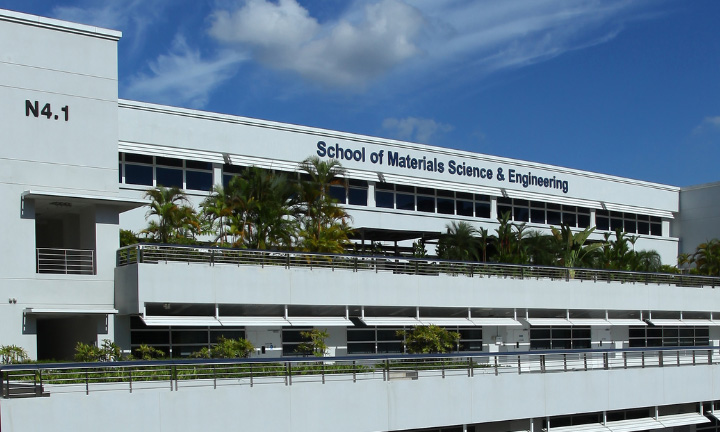MSE Colloquium @ NTU: Building with artificial atoms: The design of multifunctional nanomaterials and devices through nanocrystal self-assembly by Prof Christopher B. Murray

03 Jul 2025
01.00 PM - 02.00 PM
NTU Lecture Theatre 5 (NS2-02-07)
Alumni, Public
NTU MSE Colloquium Hosted by Nanyang Assistant Professor Prashant Kumar
Abstract
The advances in the multiscale organization of ensembles of monodisperse colloidal nanocrystals (NCs) with controlled composition, size, and shape now represent a new strategy for soft optical metamaterial fabrication. These NCs, acting as 'artificial atoms' with tunable electronic, optical, and magnetic properties, pave the way for the development of a new periodic assembly. They are ideal building blocks for incorporation into new thin films, micro-resonators, and integrated devices. In this talk, I will briefly outline the current state of the art in synthesis, purification, and integration of single-phase NCs and core-shell (heterostructures and heterodimer) NCs, emphasizing the design of semiconductor building blocks, rare-earth-based phosphors, and magnetic NCs with tunable shapes. I will then describe how these tailored NCs can be assembled into single-component, binary, and ternary NC superlattices, providing a scalable route to the production of soft metamaterials. The scalability of this process ensures its feasibility for large-scale applications. It is possible to control the formation and phase transformations in NC superlattices by adjusting the thermal energy of a nanocrystal dispersion. These structural changes can be reversed by increasing the temperature, allowing for potential modulation of the optical properties of these materials. This method offers precise control over nanocrystal assembly. The modular assembly of these NCs enables the enhancement of desirable features of the underlying quantum phenomena through photonic feedback. Strategies for emulsion-based assembly that enable continuous production and tuning of stimuli-responsive, tunable photonic resonators from dense NC 'superparticles' will be discussed. Progress in the optical characterization of superparticles and their potential whispering gallery mode resonators, with a low lasing threshold, will be shared.
Biography
Professor Christopher B. Murray (NAE, NAI, AAAS Fellow)
Dr. Christopher B. Murray holds the Richard Perry University Professorship in Chemistry and Materials Science at the University of Pennsylvania in Philadelphia, PA, where his research focuses on the preparation, characterization, and integration of nanomaterials. Prior to joining Penn, Chris was a Staff Scientist and Manager in IBM’s Research Division from 1995 to 2006, where he led the "Nanoscale Materials & Devices" Department at the T. J. Watson Research Center. He received his BSc. degree with Honors in Chemistry from St. Mary's University in Halifax, Nova Scotia, Canada (1988) and spent a year as a Rotary International Fellow at the University of Auckland, New Zealand, studying Chemistry and Materials Science before pursuing his PhD. in Chemistry at the Massachusetts Institute of Technology. While at MIT, Chris worked under the supervision of Prof. Moungi G. Bawendi, focusing on the synthesis and characterization of semiconductor quantum dots and quantum dot solids, completing his Ph.D. in 1995. The American Chemical Society recognized the pioneering contributions of Chris’s graduate thesis with the Nobel Laureate Signature Award in 1997. Professor Bawendi was a co-recipient of the 2023 Nobel Prize in Chemistry, citing contributions contained in Murray’s publication in 1993 and his thesis from 1995. Chris has continued to champion the development of materials chemistry by bringing together colloidal synthesis and nanoscale materials chemistry and with aspects of traditional top-down patterning and processing. He has expanded beyond semiconductors to explore nanomagnetics, plasmonics, phosphors, and catalysis opportunities. Increasingly, his research is focused on the application of nanotechnology and materials design to issues that impact information technology, energy and environmental sustainability, and human health. Chris has authored more than 350 scholarly articles (cited more than 80,000 times), holds over 30 patents, and has presented over 300 public lectures in the field of nanocrystal synthesis and self-assembly and on the engineering of nanomaterials and nanodevices. In 2011, he received an Honorary Doctorate from the University of Utrecht, The Netherlands, recognizing his contribution to the design of nanomaterials for energy sustainability, and in 2012, Chris was recognized as a Fellow of the Materials Research Society. He was honored with the 2016 ACS Nano Lecture Award, and he was elected to the National Academy of Engineering in 2019, The National Academy of Inventors in 2025 and was inducted as a Fellow of the AAAS in 2025. Chris also contributes to the broader scientific community in nanoscience and engineering by serving on numerous advisory boards for national and international scientific centers, journals, conferences, and professional organizations.
Biography
Professor Christopher B. Murray (NAE, NAI, AAAS Fellow)
University of Pennsylvania
